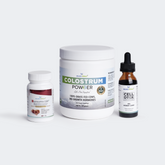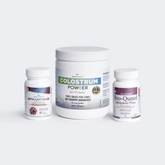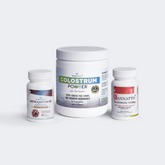How Long Do Hemorrhoids Last? Treatment, Recovery, Timeline, and Safe Relief Options
Estimated Reading Time: 6 minutes
|Let’s be honest: no one wants to talk about hemorrhoids. But if you’ve ever sat weirdly on one cheek at dinner or avoided tight jeans like they were torture devices, you know they’re real, they’re common, and they are not shy about making their presence known.
So let’s cut the awkwardness. If you’ve been quietly Googling “how long do haemorrhoids last” while pretending everything’s fine: this one's for you.
Do you know?
Hemorrhoids are surprisingly common: roughly 1 in 2 adults over 50 have had them.
First Off, What Are Hemorrhoids?
Hemorrhoids (also called piles) are swollen veins in the lower rectum or anus. They can be:
-
Internal hemorrhoids – Inside your rectum (you might not even feel them).
-
External hemorrhoids – Under the skin near your anus (yep, those can sting).
Hemorrhoids may show up as:
-
Itching or irritation around the anus
-
Pain or discomfort, especially when sitting
-
Swelling around the anus
-
Bleeding during bowel movements (bright red)
-
Burning or a feeling like something’s "down there."
Don’t panic! these symptoms are common and not always a sign of something serious.
Quick Gut Check:
If you’ve ever been pregnant, constipated, a heavy lifter, or spend a little too long on the toilet scrolling your phone: you’ve probably met a hemorrhoid.
So... How Long Do Haemorrhoids Last?
That’s the million-dollar question. And the answer is: it depends.
-
Mild cases may ease up in a few days—especially with proper care.
-
More irritated or larger hemorrhoids can stick around for a week or two.
-
Chronic or recurring ones might need longer-term support or a medical check-up.
How long they last can also depend on a few key factors:
-
Type (internal vs. external)
-
Your overall health and habits
-
What you're doing to treat or irritate them
Your body’s healing speed also ties into:
-
Your bathroom habits
-
What you eat
-
How active you are
-
Whether you take steps to relieve pressure
Bathroom Tips:
-
Skip the phone—less time on the toilet = less strain
-
Don’t wipe too hard (soft dabbing > aggressive scrubbing)
-
Drink plenty of water every day (aim for 8 cups)
-
Avoid holding it in—it only leads to trouble
What Slows Down Healing?
Here are some common reasons hemorrhoids might stick around longer:
-
Straining during bowel movements
-
Not enough fiber in your diet = hard stools = more straining
-
Sitting too long (especially on the toilet)
-
Ignoring that "go now" signal
-
Lack of physical activity
-
Chronic constipation or diarrhea
-
Dehydration (coffee ≠ water)
The good news: These are all things you can work on changing.
Myth Buster:
“Hemorrhoids always go away on their own.”
Not true. Some shrink and vanish quietly, others need more help—or medical attention.
Safe and Soothing Relief Options
Hemorrhoids are uncomfortable—but there are ways to feel better without harsh treatments or risky products.
-
Warm Sitz Baths
Time-tested. Soaking in warm water (no soap) for 10–15 minutes can ease itching and discomfort. No fancy bath salts needed—just warm water and a clean tub.
-
Cold Compress (But Not Forever)
Apply an ice pack wrapped in a cloth for 10 minutes. Reduces swelling fast—but don’t overdo it. You're icing a sensitive area, not spraining your ankle.
-
Natural Topical Options
Some plant-based creams or wipes (free of alcohol, fragrances, or steroids) may help soothe the area. Look for gentle ingredients like witch hazel or aloe vera—but check with a pharmacist or healthcare provider first.
-
Fiber = Friend
Foods rich in fiber help soften stools and reduce strain. Good picks:
-
Oats
-
Berries
-
Beans
-
Leafy greens
-
Chia seeds
Tip: Drink plenty of water with your fiber intake!
Fun Fact
Ever wonder why fiber helps so much? Soluble fiber pulls water into your stool, making it softer and easier to pass—no pushing, no pain. It’s like nature’s gentle broom for your digestive system.
-
Keep Things Moving
Short walks and regular movement help with circulation and digestion. Even a 15-minute daily walk counts.
What Does Recovery Actually Look Like?
Recovery isn't always dramatic—no confetti, no parade. Sometimes it’s just realizing you didn’t notice any pain today. Or you finally sat without wincing. Progress!
Here’s what healing can involve:
-
Less swelling
-
Bleeding stops
-
Pain or itching fades
-
You stop needing that weird “hover-sit” position
Mild hemorrhoids might go away with some home TLC. Others may need doctor-approved treatment.
Also Read: How Does Colostrum Improve Gut Health?
When to Talk to a Doctor
Reach out to a doctor if:
-
You notice a lot of bleeding
-
Pain gets worse, not better
-
The area feels hard or swollen
-
Hemorrhoids come back again and again
-
You feel a hard lump that won’t go away
-
Over-the-counter options aren't helping after a week
It’s always better to check in than tough it out. Doctors can suggest over-the-counter products or other care options that are safe. In some cases, minor procedures can quickly solve the issue (and save you months of suffering in silence).
Common Treatments (When Home Remedies Aren’t Enough)
Doctors may recommend:
-
Rubber band ligation – cutting off the blood supply to shrink it
-
Sclerotherapy – injecting medication to shrink the vein
-
Infrared coagulation – heat treatment to reduce the size
-
Surgical removal – only for severe or recurring cases
Most of these are quick, outpatient procedures. You’ll walk out with a bit of soreness but likely much more comfort in the long run.
Did You Know?
Hemorrhoids are one of the top reasons people see colorectal surgeons—but most cases never need surgery.
Before You Go… Let’s Get One Thing Straight
You didn’t ask for a hemorrhoid—but it showed up anyway. The good news? It doesn’t have to stick around. If you're wondering how long do haemorrhoids last, remember this: with the right habits, your body knows how to heal. And with a little help (and a lot of fiber), you’ll be back to sitting like royalty in no time.
Key Takeaways
-
Hemorrhoids are common and usually not serious.
-
Mild cases may go away in a few days with care (if you’re wondering how long do haemorrhoids last, the answer often depends on severity and lifestyle).
-
Lifestyle plays a big role—hydration, fiber, and avoiding straining all help.
-
Sitz baths, gentle creams, and ice packs can provide relief.
-
Talk to a doctor if symptoms persist or worsen.
Disclaimer: This blog is for informational purposes only and does not provide medical advice. Always consult a healthcare professional before making changes to your diet or health routine. Individual results may vary.
References
-
National Institute of Diabetes and Digestive and Kidney Diseases. Definition & Facts of Hemorrhoids. NIDDK. https://www.niddk.nih.gov/health-information/digestive-diseases/hemorrhoids/definition-facts (Accessed on 13 June 2025)
-
De Marco S, Tiso D. Lifestyle and Risk Factors in Hemorrhoidal Disease. Frontiers in Surgery. 2021;8(1). https://doi.org/10.3389/fsurg.2021.729166 (Accessed on 13 June 2025)
-
Healthdirect Australia. Haemorrhoids. Healthdirect Australia. https://www.healthdirect.gov.au/haemorrhoids-piles. (2020).(Accessed on 13 June 2025)
-
National Institute of Diabetes and Digestive and Kidney Diseases. Symptoms & Causes of Hemorrhoids. NIDDK. https://www.niddk.nih.gov/health-information/digestive-diseases/hemorrhoids/symptoms-causes (Accessed on 13 June 2025)
-
National Library of Medicine. Enlarged Hemorrhoids: How Can You Relieve the Symptoms Yourself? Institute for Quality and Efficiency in Health Care (IQWiG); (2017). https://www.ncbi.nlm.nih.gov/books/NBK279466/ (Accessed on 13 June 2025)
-
National Institute of Diabetes and Digestive and Kidney Diseases. Treatment of Hemorrhoids | NIDDK. National Institute of Diabetes and Digestive and Kidney Diseases. https://www.niddk.nih.gov/health-information/digestive-diseases/hemorrhoids/treatment (Accessed on 13 June 2025)
-
Medline Plus. Soluble vs. insoluble fiber. Medlineplus.gov.(2016). https://medlineplus.gov/ency/article/002136.htm (Accessed on 13 June 2025)
-
National Library of Medicine. Enlarged Hemorrhoids: What Surgical Procedures Are Used to Treat Hemorrhoids? Institute for Quality and Efficiency in Health Care (IQWiG); (2017). https://www.ncbi.nlm.nih.gov/books/NBK279465/ (Accessed on 13 June 2025)
-
Sanchez C, Chinn B. Hemorrhoids. Clinics in Colon and Rectal Surgery. (2011);24(01):005-013. https://doi.org/10.1055/s-0031-1272818 (Accessed on 13 June 2025)




































